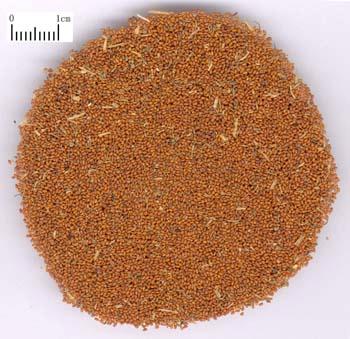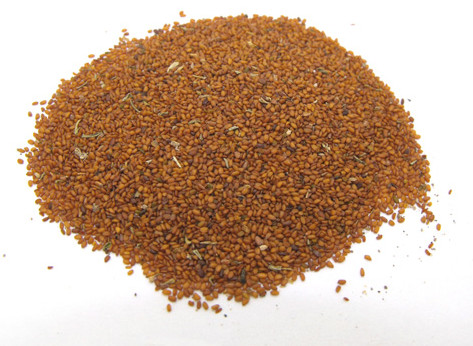Tansymustard Seed
The Processing of Tansymustard Seed
Origin
The dry ripe seed of Descurainia sophia (L.) Webb ex Prantl. or Lepidium apetalum Wild. of family Cruciferae.
Location
The Descurainia from Jiangsu, Anhui and Zhejiang provinces is called Nan Ting Li; the Lepidium from Hebei, Liaoning and Inner Mongolia Autonomous Region called Bei Ting Li.
Harvest
Collect plant in summer when seed is ripe.
The actual smell and taste
Nan Ting Li with light smell, slightly pungent and sticky taste, Bei Ting Li without bad smell, slightly bitter and pungent, strong sticky taste.
Best quality
Even, full, yellowish-brown and without impurities.
Processing
Dried in the sun to get seeds, removed impurities; unprocessed or stir-baked.
The Effect of Tansymustard Seed
Property
Bitter, pungent, extremely cold; lung and bladder meridians entered.
Actions
Purge lung to relieve dyspnea, induce diuresis to alleviate edema.
Indications
A. Cough and dyspnea due to phlegm congestion of lung
Being bitter and cold in property and with actions of descending, purging, dispersing and clearing heat, it is the key herb for cough and dyspnea with lung heat and phlegm. It excels at purging lung to relieve dyspnea. It is indicated for phlegm congestion in lung to disorder of purifying and descending of lung with symptoms of cough and dyspnea, fullness sensation in chest, unable to lie down. It is often assisted with herbs to relieve its bitter and cold property. For instance, it is combined with Da Zao in Ting Li Da Zao Xie Fei Tang from Jin Kui Yao Lue. For cough and dyspnea due to lung heat and water retention, it is combined with lung-clearing and dyspnea-relieving herbs, such as Sang Bai Pi and Xing Ren, etc.
B. Edema, pleural and peritoneal fluid
With actions of inducing diuresis, directing qi downward to regulate fluid passage for the dispersing of dampness, it is indicated for edema and dysuria. It is the strong herb for inducing diuresis and alleviating edema. It is suitable for edema, pleural and peritoneal fluid and dysuria due to obstruction of lung qi, disturbance in functioning of qi, imperforation of fluid passage. For peritoneal fluid due to damp-heat, it is combined with Fang Ji, Jiao Mu and Da Huang, etc. in Fang Ji Jiao Mu Ting Li Da Huang Wan to increase the action of inducing diuresis. For syndrome of thoracic accumulation with chest and hypochondrium edema due to combined phlegm and heat, it is combined with herbs to clear heat and induce diuresis. For instance, it is combined with Xing Ren, Da Huang and Mang Xiao and so on, in Da Xian Xiong Tang from Shang Han Lun. For deficiency-cold edema, it is combined with qi-tonifying herbs and yang-tonifying herbs, such as Ren Shen, Fu Zi and Huang Qi, etc.
Dosage and Administrations
Decoct 3~10 g. Take powder 3~6 g.
Cautions
With strong action it can damage healthy qi, so it is fit for excess syndromes. It should be used with cautions for lung qi deficiency cough and spleen deficiency edema.

